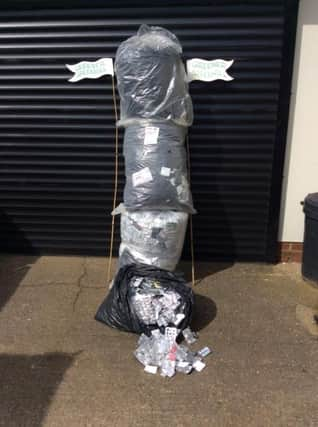Opinion: Pharmaceutical companies should take responsibility for their waste


One of our recent initiatives was to organise an extraordinarily successful recycling scheme, taking used medicine blister packs to the nearest pharmacy that would accept them at no cost to us. This was the central Superdrug store in Rotherham. Nationally the company was using the recycling process to raise money for its nominated charity Marie Curie.
We set up a collection point in partnership with our local Greenhill community library and as word spread we were collecting and taking more and more empty blister packs to Rotherham on a monthly basis. News of the initiative quickly spread and the library had to turn down requests from other local libraries and concerned groups and individuals to take blister packs from their parts of the city simply because there wasn’t enough storage space. Inadvertently we had tapped into a massive desire of residents to do something positive with these items of household waste rather than chuck them into the black bin.
Advertisement
Hide AdAdvertisement
Hide AdInitially Superdrug had told us ‘the more the merrier’, but after only a few visits we were told ‘no more’. The successful scheme had turned out to be too successful. The company told us they could no longer handle this volume of waste blister packs and were now accepting just those brought in by customers from their own personal use. Regrettably all the packs in the photo ended up in the ‘black bin’ to be burned in the Council’s incinerator that is operated by Veolia.
Sadly we had to discontinue the scheme. We were struck by the extent to which the local community had embraced it and equally by how hugely disappointed and frustrated local people were with the news of its demise. We have investigated using a recycling company, such as Terracycle , to take the collections, but we estimate this would cost around £1200 pa which is beyond our means. We are happy to arrange collections but we feel that pharmaceutical companies should take responsibility for the waste they create and meet the costs of commercial recycling. We welcome the fact that several Sheffield pharmacies are now collecting and recycling a lot of their used products such as make up packs and dental products, but we would welcome a discussion with their representatives to see what more could be done and specifically if they could help with the blister packs.
With regard to these, consider the scale of the problem. If the amount shown was collected from a relatively small community in Sheffield in just over a month, imagine how many are thrown out each week across the whole of the city. We were collecting the tiniest tip of a massive blister pack iceberg.
Producing vast amounts of waste is ultimately damaging our environment and the climate with a consequential severe impact on its and our future health. There is a clear link between air pollution and the cause of an increasing number of avoidable deaths. Emerging global research shows that air pollution is linked to increased antibiotic resistance in humans. The same research shows that antibiotic resistant bacteria are being spread by pharmaceutical and human waste with potentially disastrous future public health effects. Burying it or burning it are not wholly safe procedures. They both store up problems for the future. Sheffield’s incinerator produces energy to heat some city centre housing which is fine, but how efficiently does this relatively old incinerator burn hazardous substances?
Advertisement
Hide AdAdvertisement
Hide AdDealing with waste is not easy. Just chucking it in the bin is of course an easy option for us in the moment but it doesn’t begin to solve the larger problems that doing so is creating for our future communities. Collectively we waste a lot of stuff, dumping millions of tons of waste every year, partly because a staggering 99% of the stuff we buy is trashed within six months of purchase. In 2021, in just one week in one UK Amazon warehouse they sent 130,000 products to be destroyed, including Smart TVs and laptops.
Returning to the efficiency of our own recycling processes, we consider the number of household waste items that is collected for recycling in Sheffield is poor compared to many other parts of the country. However, we also believe there is an enthusiasm in the community to try and improve this situation. We think it would be very helpful to work together with councillors, officers, representatives from businesses, and the community and voluntary sectors to explore what more can be done about the mountains of waste we produce. In September we are going to the meeting of Sheffield Council’s Waste and Street Scene Policy Committee to ask for a commitment to appropriately support such a study.
Greener Greenhill’s all too brief foray into trying to help with recycling just one item has lifted the lid on an underlying massive problem. We are hopeful of working collectively to try and tackle some of these issues.
For more information on our activities please visit our website at https://greenergreenhill.co.uk. Follow us on Facebook @GreenerGreenhill